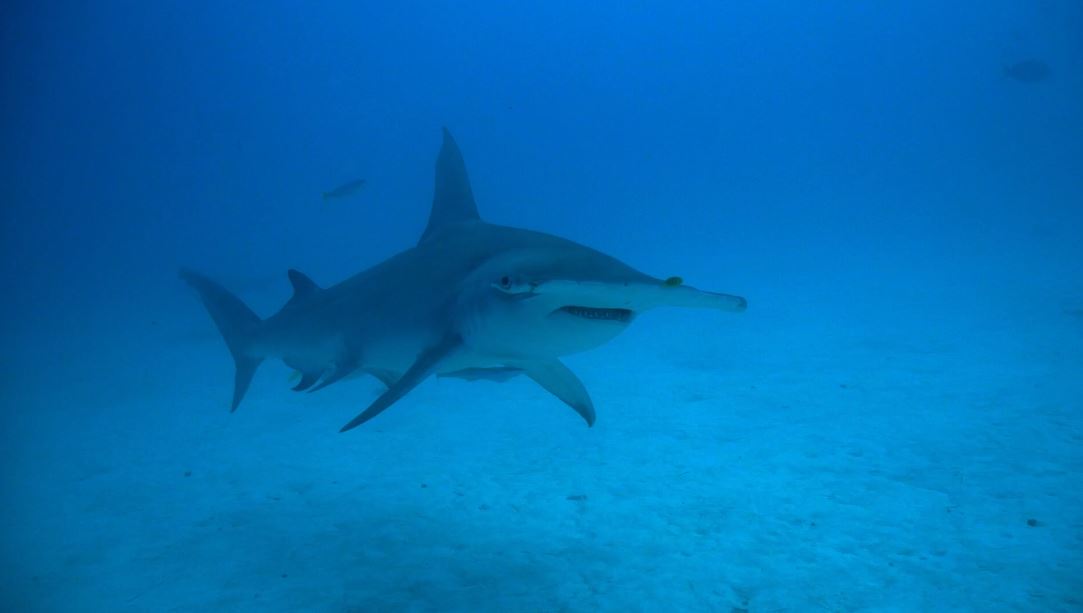Underwater
Marine biologist reveals what’s underwater at Halaveli

Here is third week’s instalment from marine biologist Robin Aiello sees her come face to face with the awe-inspiring whalesharks in the waters off Halaveli.
Whiptail Ray
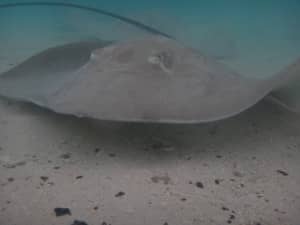 It has been another amazing week full of beautiful dives, snorkels, lagoon cruises and island walks. The weather has been clear and warm, and the seas so calm that you can do an entire marine biology session from the surface without even getting wet.
It has been another amazing week full of beautiful dives, snorkels, lagoon cruises and island walks. The weather has been clear and warm, and the seas so calm that you can do an entire marine biology session from the surface without even getting wet.
I have, in fact, been spending hours on the jetty with guests looking down into the sea and spotting some fantastic animals. We have many harmless blacktip reef sharks that slowly cruise back and forth under the jetty, whiptail rays that look almost like eagles flying through the water, unicorn fish with their long horns sticking out from their foreheads, long slender coronet fish with their huge extended mouths, and bluefin trevallies (also called jacks) chasing schools of small silver fish.
Bluefin Trevallies
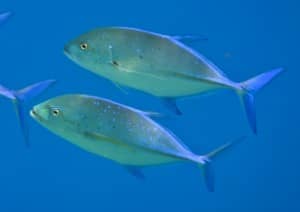
The trevallies (jacks) always put on an exciting show for us as they stalk and hunt the small silver fish that form massive schools in the very shallow water at the beach.
Small groups of 3 – 6 bluefin trevallies swim up and down the beach, getting closer and closer to the shore and forcing the small fish to form tighter and tighter schools – it is like cowboys rounding up the cattle on a range.
They do this for some time, then, without any warning, there is a huge commotion. The trevallies have decided it is time to strike, and change direction at full speed (which is really really fast) and dash through the school, grabbing fish as they go. The small silver fish, in response, take off in all directions like a firework display. They will even jump out of the water and land on the beach in their sheer panic to get away.
But, there is no where for the small fish to hide. Suddenly other predatory fish join the feeding frenzy, and if that is not bad enough, the seabirds and herons fly in from all directions to join the mayhem and pounce on any fish they can. The whole frenzied activity lasts only a few seconds, but what excitement! Sometimes I feel sorry for the poor little fish!
An unplanned evening snorkel
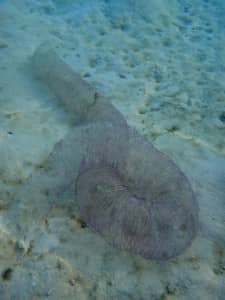
Probably the most unusual thing that I have seen in a long time was spotted one evening from the jetty. I was heading to dinner, all dressed up, and one of the guests asked me what it was – I had no idea – didn’t even know if it was manmade or natural.
So I ran back to my villa and grabbed my snorkeling gear and jumped into the water.
This thing was weird! At first, I had no idea what it was. It was in constant motion, rolling around and undulating, but I soon discovered it was the water movement that caused it to move – it was not actually alive. It was slimy and felt like thick mucous, and to add to the bafflement, there were thousands of little pink/purple balls embedded in it.
Finally it dawned on me that it had to be some sort of egg case – most likely molluscan from either a snail or a squid. After a couple of hours of research I discovered that it was, in fact, the egg case of a very large squid that reaches a size of over 1 metre called the Diamondback Squid. This squid would have laid the egg case out in the lagoon and the tides, currents and waves washed it into the shallows. Very interesting.
Diving with whalesharks
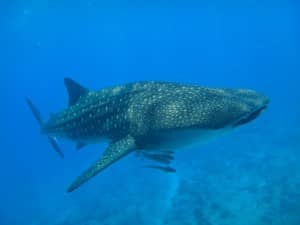
Yesterday, though, was the real highlight of my whole visit – every Sunday the Dive Center offers a day trip to find and snorkel with whalesharks. And what a day we had!
Thanks to our amazing boat crew, and of course the legendary snorkel guide Santana, we had the wonderful experience of swimming with 3 large whalesharks. Amazing! It is no easy feat to find a whaleshark – since they are fish, they do not come to the surface to breath like whales, so the only way to find them is to patrol an area – up and down along the coast. The crew stand lookouts on the roof of the boat looking for a large dark shadow in the water.
Then, if one is spotted, there is a flurry of activity as we get on our gear and jump overboard. At this point, the race begins. Although these huge animals are barely moving a fin at all, they maintain such a fast speed that we as mere human snorkellers must kick and kick and kick as fast as possible to keep up with them. They do not seem to be bothered by us at all – in fact, on several occasions they appeared to be curious and changed direction to come right up close underneath – within only a few metres of us.
When they are this close, they take your breath away. They really are special creatures!
They are so spectacular, that this creature will be the topic of my Creature Feature for this week.
Creature Feature – Whalesharks
Whalesharks are well known to frequent a spot on the southern part of the Ari Atoll – no one really knows why they ‘hangout’ in this area. But they seem to be mainly young-adult males that are about 6–8 metres in length.
Although this is considered relatively small for a whaleshark (they can reach sizes of over 12m) they are still incredibly impressive. In fact, whalesharks are the largest fish in the world.
Whalesharks are a type of shark – not a whale. They, like all sharks, have a cartilaginous skeleton rather than bone, have what are called denticles covering their skin instead of scales, do not have an air bladder, but use a liver full of oil for buoyancy, and of course they have ‘replaceable’ teeth rather than only one set like most reef fish. Sharks have hundreds of teeth and can go through as many as 30,000 teeth during their lifetime.
What happens is that teeth that form the ‘front-row’ periodically fall out, and within only a few days another tooth that behind in the ‘second-row’ will rotate into position. It is kind of like a conveyor belt of teeth. In this manner the shark always has fresh, sharp teeth! Whalesharks, although they do not use them, actually have about 300 very small teeth.
How whalesharks feed
So how does a whaleshark feed if it does not use teeth? Well, these giants of the sea, feed on some of the smallest animals in the ocean, plankton, by a method called filtering feeding.
Inside their mouths they have an unique system of filter-pads that trap all the small plankton – a lot like a sieve.
Whalesharks feed in two ways – ‘gulping’ and ‘ram feeding’. If there is plenty of concentrated plankton in the water, these sharks will stay in one place and take in huge gulps of water full of plankton.
If, however, the plankton is spread out in the water, then the sharks will swim at an average of 4km per hour with their mouths open – when they have enough food, they will swallow, then resume feeding – this is ‘ram-feeding’.
To watch them feed is incredible. They have huge mouths – up to 1.5 metres wide and they can filter over 300,000 litres of seawater per hour.
Identifying whalesharks by their spots
Other than the sheer immense size of these fish, the other really noticeable feature is the patterning. They are fully covered with spots and dots, and some lines – really beautiful.
They almost look like a bright starry night sky. In fact, a few years ago a couple of scientists came up with the interesting idea to use a computer program designed for tracking stars to document the spots on individual whalesharks.
Since the patterning on each whaleshark is unique for that individual (much like our human fingerprints are unique to each person), scientists have been able to compile a global database of whalesharks from photographs of their spots.
So, when you visit Halaveli Resort, be sure to take the trip out looking for whalesharks – it is fantastic!
Action
Dive into memorable underwater adventure with Baros Maldives’s Eco Explorer Experience

In today’s world, where the fragile balance of marine ecosystems teeters on the edge, to call for sustainable tourism practices resonates louder than ever. Baros Maldives, deeply rooted in its respect for nature, leads the way in conservation and preservation. Baros’s Eco Explorer Experience stands as a testament to the island’s commitment, inviting guests to not just observe but to actively contribute to the safeguarding of our underwater sanctuaries.
Nestled on a lush, natural island paradise, Baros is a sanctuary surrounded by a kaleidoscope of marine life, boasting a world-class house reef, celebrated for its unparalleled beauty and biodiversity, attracting adventurers and nature lovers alike.
The Eco Explorer Experience is a carefully curated immersive experience designed for those who seek to delve deeper into the mysteries of the ocean. This experience is more than an adventure; it’s a journey of discovery and contribution, offering intimate encounters with the marvels of the sea, all while promoting marine conservation.
With this experience, Baros guests enjoy a myriad of enriching activities, culminating in a bespoke photobook documenting the essence of their Eco Explorer journey beneath the waves.
Coral Restoration and Conservation: Participants will immerse themselves in coral ecology, by planting personal coral gardens under the guidance of Baros’s resident Marine Biologist. This hands -on experience not only fosters coral growth but also contributes to the restoration of these vital habitats. Through the Coral Cube initiative, guests will apply innovative techniques like using fast plug cement to build thriving underwater ecosystems. The Baros marine team will share bi-annual updates with the guests so that they can follow the growth of their corals.
Marine Life Identification: This educational session equips guests with the knowledge to identify different fish species and understand their vital roles within the marine ecosystem. Equipped with snorkelling gear and new insights, guests will explore Baros’s world- class house reef during a snorkelling tour, guided by the resident marine biologist, to witness the vibrant marine life.
Night Snorkelling and Bioluminescence: As night falls, the reef reveals a different kind of beauty. With UV lights, guests will explore this nocturnal wonderland, observing the reef’s inhabitants in a new light. This magical experience is not only enchanting but also educational, offering insights into coral health and the ecosystem’s delicate balance.
Baros recognises the fragility of the marine environment and is committed to fostering sustainable tourism practices. The Eco Explorer Experience is more than a holiday activity, it’s an invitation to become part of a larger movement, advocating for the protection and preservation of our marine environments.
Join the Baros marine team on this extraordinary journey. Together, dive deeper, explore further, and unveil the boundless wonders of the ocean, ensuring they remain vibrant for generations to come.
For bookings and more information, please visit www.baros.com or contact Baros directly at reservations@baros.com or call +960 664 26 72.
Action
Six Senses Laamu celebrates anniversary of Sea Hub of environmental learning in Laamu

Six Senses Laamu commemorates the one-year anniversary of its Sea Hub of Environmental Learning in Laamu (SHELL), highlighting the resort’s steadfast dedication to marine conservation and environmental education.
In March 2023, Six Senses Laamu unveiled the SHELL on its sunset beach, marking a pivotal milestone in the journey toward fostering environmental awareness and education. The 2,336 square-foot (217 square-metre) immersive exhibition space invites resort guests, hosts, and Maldivian residents to explore and learn about the colorful and vibrant local marine life. Investing further in marine conservation, the SHELL houses a working marine laboratory run by the Maldives Underwater Initiative (MUI), a collaborative endeavour featuring marine biologists from Six Senses Laamu, working hand in hand with three partnering NGOs: Manta Trust, Blue Marine Foundation, and Olive Ridley Project. Currently, the research team comprises over ten marine biologists.
Collaborative Research Efforts Yield Remarkable Results
The SHELL has expanded MUI’s research capabilities, with notable projects including coral larval restoration and sea turtle DNA analysis. Ten thousand baby corals from over five different species are currently grown at the SHELL. Over 12 million coral larvae have already been released onto the resort’s house reef. The turtle genetics project involves taking genetic samples from deceased hatchlings and continues to contribute to a better understanding of the Maldivian sea turtle population.
In addition to these projects, the MUI team has conducted numerous research initiatives, such as the identification and registration of over 1,000 turtles and more than 140 manta rays in Laamu Atoll. These research projects contribute to a wider understanding of Laamu’s marine life and environment, resulting in the publication of a peer-reviewed scientific paper on marine megafauna and blue carbon analysis of seagrass and mangrove habitats.
Community Engagement and Recognition
Throughout the past year, the SHELL has welcomed 24 distinguished visitors, including renowned naturalist and BBC presenter Steve Backshall. Engagements with university professors, researchers, and even astronauts during Karman Week, have led to valuable partnerships and research collaborations.
Beyond research, the SHELL serves as a space for exploration and education. Six Senses Laamu has welcomed over 300 community members to the SHELL over the past year. A key initiative, the “Hello Hallu” program, was designed to inspire and motivate students to actively participate in preserving their local ecosystems. The program achieved widespread impact by reaching every school across Laamu Atoll, engaging 237 students in total. Together, with the MUI team, students explored the habitats of Laamu, including mangrove forests, seagrass meadows, and coral reefs, as well as sustainable fishing practices and megafauna.
The SHELL was honoured with the Aspire Sustainability Initiative of the Year Award in 2023, recognising the groundbreaking sustainability efforts by Six Senses Laamu and showcasing the resort’s commitment to marine conservation.
“The SHELL is an incredible achievement from our efforts in research, education and community engagement,” says Lawrence Menz, Six Senses Laamu’s Director of Sustainability and Conservation. “It began as a dream over 5 years ago and marks several milestones in Laamu Atoll’s marine conservation. Since its opening, we were able to welcome over 6,000 guests and members of the local community in the SHELL. The greatest reward for us is hearing local students expressing their newfound inspiration for their island home, stating that visiting the SHELL has encouraged them to share the importance of conservation with their parents, family, and friends.”
Six Senses Laamu’s General Manager, Marteyne van Well, commented, “The SHELL serves as a testament to our unwavering dedication to environmental stewardship, providing a dynamic platform to inspire, educate, and contribute to the ongoing conservation efforts in the Maldives.”
Van Well has also recently been recognised in Forbes magazine as one of ‘4 Women Creating Ways To Protect The Ocean,’.
Action
Diving Dreams Take the Plunge: New PADI Five Star Academy Opens in Maldives

Maldives’ first and only PADI Five Star Career Development Center, the Maldivian Academy of Diving, has officially opened its doors in K. Himmafushi. This new academy signifies a major step forward for professional dive training in the Maldives.
The Academy is dedicated to providing top-tier, professional-level dive training programs that meet the most rigorous standards set by the Professional Association of Diving Instructors (PADI). They recently concluded their inaugural PADI Instructor Development Course on March 3rd, and their next PADI Open Water Scuba Instructor Course is scheduled for July 29th to August 13th, 2024.
Leading the Academy is Adam Ashraf, a PADI Platinum Course Director for both 2022 and 2023. For the past decade, Ashraf has been running Dive Desk, a highly successful dive center in Malé. In fact, Dive Desk was the most successful PADI professional development center in the Maldives in 2023, earning the prestigious PADI EMEA Platinum Professional Development Excellence Award. This award recognizes the center’s exceptional performance in training new dive professionals, with Dive Desk being the only Maldivian center and one of only ten in the entire Europe, Middle-East & Africa (EMEA) region to receive this recognition.
Platinum status for both the Course Director and the Dive Center is not given lightly. It’s awarded based on a strict criteria of the number of professional-level certifications issued by PADI. Adding to Dive Desk’s accolades, they were also awarded the PADI Outstanding Contribution to People and Humanity Award last month for their dedication to fostering opportunities for Maldivians in the diving industry.
Despite a decade of success and consistently running the top PADI professional development programs in the Maldives for the past seven years, Dive Desk faced challenges. Limited space at their facility and the high cost of accommodation for students staying in Malé for extended periods were significant hurdles.
The Maldivian Academy of Diving was established specifically to address these issues. Located in Himmafushi, the Academy offers a more spacious learning environment and affordable accommodation options for students, all within close proximity to the capital city. The Academy will soon be offering on-site dorm rooms as well.
The Academy caters to all levels of diving experience, from those just beginning their underwater journey to seasoned divers seeking to become instructors. They offer a comprehensive range of courses and certifications to equip students with the skills and knowledge needed to achieve their diving goals.
The opening of the Maldivian Academy of Diving represents a significant milestone in Adam Ashraf’s ongoing mission to empower Maldivian youth to pursue careers in the diving industry.
For more information dive into www.divedesk.mv
-

 Insiders7 days ago
Insiders7 days agoMarriott International doubles down on luxury in the Maldives with focus on sustainability and local talent
-

 News1 week ago
News1 week agoCinnamon Hotels offers Summer Bucket-list for Maldives
-

 News1 week ago
News1 week agoConrad Maldives Rangali Island ushers in Thai New Year with Songkran celebrations
-

 News1 week ago
News1 week agoThe Nautilus Maldives announces 2024 collaboration with Ananda in the Himalayas
-

 News1 week ago
News1 week agoKaris Scarlette’s Dance & Wellness Retreat returns to Avani+ Fares Maldives Resort
-

 News5 days ago
News5 days agoSirru Fen Fushi to operate as an independent luxury resort (no longer Fairmont)
-

 Awards6 days ago
Awards6 days agoSummer Island Maldives recognised as Global Hotel Awards Quality Winner 2024 by TUI Group
-

 News5 days ago
News5 days agoSun Siyam Iru Fushi Maldives to host International Yoga Day celebration with Yoga expert Preeti Kalia






